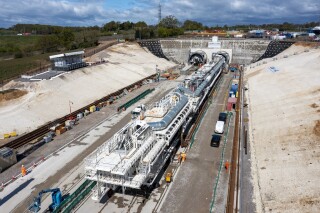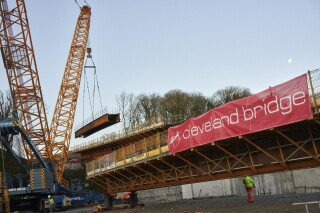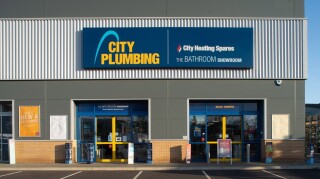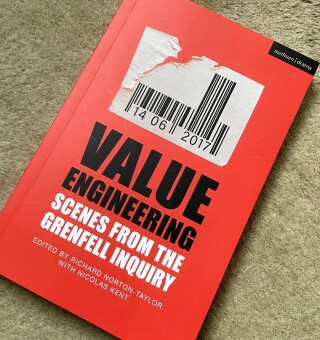Despite the UK still being in lockdown at the start of 2021, the construction industry began the year optimistically. It had largely been back at work for six months already and the government had agreed a trade deal with the EU that we thought would maintain continuity in the cost and availability of construction products and materials.
If only.
In fact the business story of the year was shortages of materials and skilled labour, including lorry drivers, which in turn exacerbated materials shortages. A container vessel getting stuck in the Suez Canal for six days in March didn’t help, clogging a main artery of world trade.
Factory production around the world had been interrupted by the pandemic in 2020 and was struggling to catch up. Brexit-related friction at UK borders impeded the smooth passage of badly needed construction products and materials. And a shortage of lorry drivers added to supply chain logjams.

The Road Haulage Association said that the UK was short of 100,000 lorry drivers. Many were swift to blame Brexit for this – a ready source of labour having been extinguished. But the issue had been bubbling for a long time, with lorry drivers having for years been made to endure poor conditions for inadequate reward. HGV driving tests had stopped taking place because of the pandemic, stemming what supply of new blood there might have been.
The government responded by relaxing the drivers’ hours rules to January 2022, adding 4,700 HGV drivers to its existing visa scheme and providing funds for new driver training programmes.
A situation report from the Construction Leadership Council in August confirmed that timber, cement, roofing products, bricks, blocks, insulation, steel and cable management systems were all in short supply. And the lack of hauliers meant that some suppliers were telling builders merchants to come and get their orders themselves as they were unable to make deliveries.
Shortages – and the rise in prices they created – were routinely cited as the main underlying cause of a decline in construction output. Official government statistics showed that since the initial Covid-induced crash in activity in April 2020, construction output across Great Britain had climbed assertively to pass pre-pandemic levels by spring 2021. But after four successive quarters of growth, the third quarter of the year brought a 1.5% fall in output.
This picture was mirrored by the monthly survey of construction industry purchasing managers, whose graph rose steadily at the start of the year, showing activity rising at an accelerating pace through the spring peaking at a reading of 66.3 in June, before decelerating through the summer, before picking up again in October and November.
By the end of the year it feels as though a corner has been turned, with the supply chain crisis easing and new orders rising. But we are not out of the woods yet.
On the whole it was, of course, the SMEs that bore the brunt of the pain. (They always do.) Tier one contractors frequently reported that while they were aware of these issues, they were too clever to be damaged by them. This was particularly true for those working on the HS2 project, which seemed to have its supply chains in good order.
While HS2 construction work officially began in 2020, and in truth has been going on for several years with substantial preparations, it was 13th May 2021 that marked perhaps the biggest milestone to date, with the launch of tunnel boring machine Florence from the Chilterns tunnel south portal site next to the M25 in Hertfordshire. She was followed by sister machine Cecilia on 2nd July, drilling the parallel 10-mile bore under the Chilterns. All being well, we can expect to see them again at the back end of 2024.
We will not, however, be seeing any more preparatory work on the planned HS2 leg to Leeds, which was cancelled towards the end of the year after months of press leaks preparing us for the bad/good news (delete according to perspective).

Mergers, acquisitions and corporate failures
Issues relating to the pandemic were never far from the headlines. In the summer we had a 'pingdemic'. Were it not for government intervention, we might have expected to see many construction companies go to the wall. As it is, most have survived (so far) but not all. Among the failures were Wildgoose, a £50m-turnover, fourth-generation family building firm in Derbyshire that fell victim to rising raw material prices, supply chain disruption and labour shortages, resulting in many of its fixed-price contracts becoming loss-making, according to its administrators. Blackpool-based Create Construction fell to cashflow problems while building a new hotel.
The most high-profile corporate failures of the year, however, were Cleveland Bridge and NMCN.

144-year-old Cleveland Bridge, Saudi-owned for the past 20 years, went into administration in July. Attempts were made to find a buyer – surely the company that supplied structural steelwork for the Shard, Wembley Stadium and the Humber Bridge could not be allowed to disappear, most of us thought – but there was no saviour to be found. By the end of September, production stopped and the business closed.

Stock exchange listed NMCN (North Midland Construction, as was) proved to be quite the saga, with regularly shareholder updates during the year as it kept delaying publication of its accounts while trying to work out exactly how much money it had been losing. A white knight did ride to the rescue in June, with Carlisle-based Svella, set up in 2018 by former Stobart executives Andrew Tinkler and Ben Whawell to invest in under-performing companies, offering buy a controlling stake. But the deal depended on getting the 2020 accounts sorted, which never happened. In October, administrators were called in. We told the full saga in our previous issue.
Svella acquired the telecoms business of NMCN, together with the plant hire, transport and accommodation divisions, securing more than 680 jobs out of the 1,700 total employees across the group. Galliford Try paid £1m for the water operations, taking on approximately 900 employees. Keltbray Highways bought the infrastructure and highways business, taking on 117 employees.
Other notable acquisitions during the year included: Altrad buying RMD Kwikform from Interserve; M Group Services paying £50m for Skanska UK’s highway maintenance and street lighting business (renaming it Milestone); and Bouygues buying Equans, the newly rebranded regeneration and facilities management business of Engie, for £6bn. The latter deal sees Bouygues gaining another 74,000 people in 17 countries, including 13,500 in the UK.

This was also the year that Charlie Mullins, the colourful founder of Pimlico Plumbers, decided it was time to cash out, selling to US home service company Neighborly, owned by private equity giant KKR, for a reported £130m.
Nowhere was there more M&A activity than among builders’ merchant sector, however, as private equity players – notably Cairngorm Capital and Blackstone – sought to consolidate the sector.
Cairngorm, via Grant & Stone, the High Wycombe merchant it took over in 2019, made its first addition of the year in January, buying CRS Building Supplies, based in Wells, Somerset. In March it raided the West County, snaffling all 22 branches of Rawle Gammon & Baker (RGB), as well as smaller traders Buildit and Total Plumbing Supplies.
Cairngorm also owns The Independent Builders Merchant Group (IBMG), created out of Parker Building Supplies (acquired in 2018) and Chandlers Building Supplies (2019). In October this year it added Sussex Plumbing Supplies and Plymouth-based Perrys Builders Merchants.

Private equity group Blackstone entered the fray this year by taking over Inflexion Private Equity Partners’ position in Huws Gray and continuing its run of acquisitions. Joining the Huws Gray Group this year was TBS Building Supplies in Northamptonshire and Exall & Jones in Swansea. To date, Huws Gray’s biggest acquisition had been Ridgeons in 2018, adding 40 outlets to its network. However, on 1st July it revealed that it had agreed a £520m deal to take over Grafton’s traditional merchanting businesses in Great Britain – including Buildbase, Civils & Lintels, PDM Buildbase, The Timber Group, Bathroom Distribution Group, Frontline and NDI. This is still churning through the regulatory process and is expected to complete in the spring.

Travis Perkins, meanwhile, has been moving in the opposite direction, making itself leaner and meaner to take on these new challengers. It hived off its Wickes chain, which is now a standalone plc, and sold its plumbing and heating businesses – Plumbing Trade Supplies (PTS) and City Plumbing Supplies (CPS) – to Florida private equity firm HIG Capital for £325m.
For independent builders merchants, it must be reassuring to know that know matter how hard it has been to find stock to put on your shelves this year, or how hard it has been to keep customers satisfied with prompt and complete deliveries, there are at least some people out there with very deep pockets ready to make an offer to let you retire to an island in the sun.
For others, however, selling up may not be so straightforward. As explored in these pages before, selling to an employee ownership trust is an increasingly popular exit strategy because of the tax benefits. Employee buy-outs continued to make the news in 2021. Buckingham Group Contracting, Readie, Clegg, Falco, Clifford Devlin and GCL all went this way, as did consulting engineer Curtins.
Brothers Ray and Des O’Rourke might have considered this option for their business, Laing O’Rourke. However, chief executive Ray O’Rourke revealed to the Financial Times in August, five months shy of his 75th birthday, that they plan a Stock Exchange listing instead. “We will float the company in a few years’ time,” he told the newspaper. “By 2024 we will be in good shape.”
Three months later he named his successor, revealing that Seamus French, an executive with the mining company Anglo American will become managing director of the Europe Hub in January and CEO in September 2022, leading the company towards life after Ray.
Good citizens
Beyond all the usual business of trying to win work and turn a profit, issues of social responsibility – being a good corporate citizen and good employer – continued to grow in importance.
With the UK hosting the Cop26 global environmental summit in the autumn, the year saw a litany of organisations setting out their plans for net zero, as indeed they now must. Prospective suppliers bidding for contracts above £5m a year now need to have committed to the government’s target of net zero by 2050 and have published a carbon reduction plan. Firms which fail to do so will be excluded from bidding for the contract, the Cabinet Office announced in June.

Not just companies, but industry associations and product groups have all produced ‘road maps’ showing their intended paths to net zero. More and more companies have trialled low carbon technologies and fuel. Sales of hydro-treated vegetable oil (HVO) to construction companies grew dramatically in 2021 as an alternative to traditional DERV fuel. Hopes that chancellor Rish Sunak might allow HVO to continue to be subsidised were not realised. The red diesel tax rebate ends on 1st April 2022 for all kinds of diesel, whether plant-based or fossil- based. In the longer term, the future of construction machinery fuel looks to be a choice between lithium-ion batteries, hydrogen fuel cells and liquid hydrogen. All have substantial benefits and disbenefits. Liquid hydrogen is gaining traction, however, with some important backers.

In August Buta Atwal, chief executive of Ryze Hydrogen and former managing director of JCB Heavy Products, told the Re:Construction podcast that liquid hydrogen-powered construction machinery, already in development, will start to become mainstream on UK construction sites within two to five years. Just a couple of months later JCB revealed that it was investing £100m on a project to produce hydrogen combustion engines and would have machines on sale by the end of 2022.
Also hoping to make the world a better place is the Building Safety Bill, which started its passage through parliament in July. This is the legislation implementing many of the core recommendation of Dame Judith Hackitt’s review of the building industry’s regulatory framework, commissioned by government after the 2017 Grenfell Tower fire.
The official inquiry into that even continued during 2021 after Covid-related delays. Those unable to sit through the countless days of testimony were offered a condensed version in Notting Hill’s Tabernacle Theatre in October. Value Engineering: Scenes from the Grenfell Inquiry was a verbatim dramatic reconstruction of edited highlights of the inquiry featuring, among others, witnesses from Rydon, Harley Curtain Wall, Studio E and other parties involved in the refurbishment that made the fire so lethal. The stage show moved on to the Birmingham Rep in November. The director, Nicolas Kent, was a guest on Episode 80 of Re:Construction (16th September 2021).

Much less dramatic, but a surprise nonetheless, was the Construction Industry Training Board’s announcement in March that it had shelved plans to sell its colleges and quit training. Its inability to find suitable buyers for Bircham Newton and Inchinnan means that the CITB will now stay in the business of training after all. At least for the time being. It was a year of campaigning for the CITB, as it sought industry consensus for its levy renewal – a process delayed from 2020 due to Covid. Overall, 66% of levy-paying employers agreed to the proposals – or 63% if measured by the total amount of levy they pay. A definite mandate for levy renewal, but perhaps narrower than CITB’s new chief executive Tim Balcon, who took over from Sarah Beale in September, might have wished for.
Names and faces
There were many new names on the scene in 2021. Highways England became National Highways in August, for no apparent reason (although the pointless rebrand has done nothing to repair its image damage by smart motorways and the vandalism imposed on old railway structures – both stories that figured large in our 2021 news coverage and will surely continue in the year ahead).

Actuate UK was born in February as an alliance of eight specialist engineering membership associations, superseding the Specialist Engineering Contractors' Group which was wound up the previous month, as its erstwhile driving force, Rudi Klein, rode off into pseudo-retirement.

We were also introduced this year to the folk singer Nancy Kerr, already acclaimed in folkie circles, but given wide prominence among construction types when the British Tunnelling Society (BTS) commissioned her to write a song to mark its 50th anniversary. She came up with five, and released the EP, Tunnellers. Both Nancy and tunneller Benoît Jones of the BTS made a welcome appearance on the Re:Construction podcast (Ep60, 28th April).
Tilbury Douglas is not a new name but had been away for 20 years. It was what Interserve used to be called before it wanted to be seen as primarily a facilities management business. But with Interserve Facilities Management having been sold to Mitie at the end of 2020, the Tilbury Douglas brand was relaunched in March for what is now quite definitely a construction company. The tarnished brand of Interserve remains only as a legal entity.
Also making a welcome return to the headlines in 2021 were the Shrewsbury pickets, 24 construction workers found guilty of offences including unlawful assembly, affray, intimidation and conspiracy to intimidate during the 1972 national building strike. Among the six who were jailed was Ricky Tomlinson, who went on to find fame as an actor in Brookside and The Royal Family since he was unable to work in the construction industry again. Campaigners have for years argued that the trial process was tainted by political interference; 14 of the original 24 have continued with their legal battle for 47 years. In March 2021 the Court of Appeal finally quashed their convictions. “By the standards of today, what occurred was unfair to the extent that the verdicts cannot be upheld," ruled Lord Justice Fulford.
In a year of clouds, it was one of the silver linings.
Re:Construction Podcast: Bishop and Taylor look back and some of the highlights and lowlights of construction industry news in 2021. Listen online. 15th December 2021 Ep 90.
Got a story? Email news@theconstructionindex.co.uk






